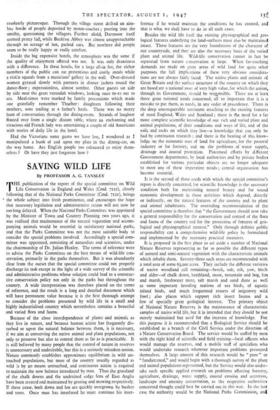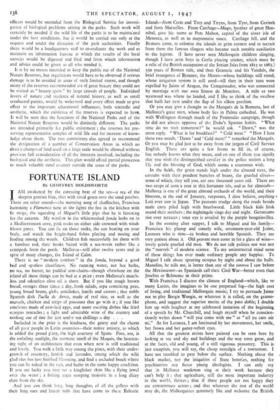SAVING WILD LIFE
By PROFESSOR A. G. TANSLEY
THE publication of the report of the special committee on Wild Life Conservation in England and Wales (Cmd. 7122), closely following that of the National Parks Committee (Cmd. 7121), brings
• the whole subject into fresh prominence, and encourages the hope
that necessary legislation and administrative rction will not now be too long delayed. When the National Parks Committee was appointed by the Minister of Town and Country Planning two years ago, it was realised that maintenance of the natural vegetation and accom- panying animals would be essential in satisfactory national parks, and that the Parks Committee was not the most suitable body to consider the special problems involved. Accordingly a special com- mittee was appointed, consisting of naturalists and scientists, under the chairmanship of Dr. Julian Huxley. The terms of reference were to advise the Parks Committee on the best means of wild-life con- servation, primarily in the parks themselves. But it was abundantly clear from the outset that the special committee could not properly discharge its task except in the light of a wide survey of the scientific and administrative problems whose solution could lead to a construc- tive conservation policy not only in the parks but thrOughout the country. A wide interpretation was therefore placed on the terms of reference, and the result is a long and detailed document which will have permanent value because it is the first thorough attempt to consider the problems presented by wild life in a small and highly industrialised country which nevertheless contains a beautiful and varied flora and fauna.
Because of the close interdependence of plants and animals as they live in nature, and because human action has frequently dis- turbed or upset the natural balance between them, it is necessary, if we aim at conserving the native animal and plant populations, not only to preserve but also to control them as far as is practicable. It is still believed by many people that the control of nature in reserves is unnecessary and undesirable, but this is a seriously mistaken notion. Nature commonly establishes approximate equilibrium in wild un- touched populations, but most of the country usually regarded as wild is by no means untouched, and continuous action is required to maintain the new balance introduced by man. Thus the grassland of the chalk downs and the undrained sedge fens of East Anglia have been created and maintained by grazing and mowing respectively. If these cease, both down and fen are quickly overgrown by bushes and trees. Once man has interfered he must continue his inter-
ference if he would maintain the conditions he has created, and that is what we shall have to do in all such cases. .
Besides the wild life itself the existing physiographical and geo. logical features underlying the land-surfaces must also be maintained intact. These features are the very foundations of the character a our countryside, and they are also the necessary basis of the varied plant and animal life. Wild-life conservation cannot in fact be separated from nature conservation at large. When far-reaching demands are made on great areas of wild land for quite other purposes the full implications of these very obvious considera. tions are not always fairly faced. The native plants and animals ot Great Britain and the surface structure of the country on which they are based are a national asset of very high value, for which the nation, through its Government, should be responsible. There are at least three great national needs concerned, all so important that it is a mistake to put them, as needs, in any order of precedence. There is the deep unconquerable sentiment attaching to the existing features of rural England, Wales and Scotland ; there is the need for a far more complete scientific knowledge of our rich and varied plant and animal populations, of their conditions and ways of life, and of the soils and rocks on which they live—a knowledge that can only be had by continuous research ; and there is the bearing of this know- ledge on the economic uses of land for agriculture, for the pastoral industry or for forestry, and on the problems of water supply, drainage and coastal promotion. Piecemeal efforts by different Government departments, by local authorities and by private bodies established for various particular objects are no longer adequate to meet any of these imperative needs ; central organisation has become essential.
It is the second of these needs with which the special committee's report is directly concerned, for scientific knowledge is the necessary condition both for maintaining natural beauty and for sound economic development in those activities which depend, directly or indirectly, on the natural features of the country and its plant and animal inhabitants. The overriding recommendation of the special committee is therefore that " the Government should now take a general responsibility for the conservation and control of the flora and fauna of the country and for the protection of features of geo- logical and physiographical interest." Only through definite public responsibility can a comprehensive wild-life policy be formulated and implemented by the necessary practical measures.
It is proposed in the first place to set aside a number of National Nature Reserves representing as far as possible the different types of natural and semi-natural vegetation with the characteristic animals which inhabit them. Seventy-three such areas are recommended with a total area of some 63,000 acres. They include the different varieties of native woodland still remaining—beech, oak, ash, yew, birch and alder—of chalk down, heathland, moor, mountain and bog, fen and marsh, freshwater mere, salt marsh and sand dune as well as some important breeding stations of sea birds, of aquatic inland birds, and much frequented resorts of migratory wild fowl ; also places which support rich insect faunas and a few of specially great geological interest. The primary object of National Nature Reserves is the maintenance of characteristic samples of native wild life, but it is intended that they should be not merely maintained but used for the increase of knowledge. For, this purpose it is recommended that a Biological Service should be established as a branch of the Civil Service under the direction ofl a Nature Conservation Board. The service would be staffed by men with the right kind of scientific and field training—local officers who would manage the reserves, and a mobile staff of specialists who would undertake research wherever important problems presented themselves. A large amount of this research would be " pure " or "fundamental," and would begin with a thorough survey of the plant and animal populations represented, but the Service would also under- take such specific applied research on problems affecting forestry, agriculture, drainage, water supply, coastal erosion and accretion, landscape and amenity conservation, as the respective authorities concerned thought could best be carried out in this way. In the last case the authority would be the National Parks Commission, anti officers would be seconded from the Biological Servke for investi- gation of biological problems arising in the parks. Such work will certainly be needed if the wild life of the parks is to be maintained under the best conditions, but it would be carried out only at the request and under the direction of the park authorities. Finally there would be a headquarters staff to co-ordinate the work and to maintain an information bureau at which the results of the local surveys would be digested and filed and from which information and advice could be given to all who needed it.
It is by no means intended to keep the public out of the National Nature Reserves, but regulations would have to be observed if serious damage is to be avoided in areas of such limited extent, and though many of the reserves recommended are of great beauty they could not be visited as " beauty spots " by large crowds of people. Individual lovers of nature end students of natural history, as well as small conducted parties, would be welcomed and every effort made to give effect to the important educational influences, both scientific and aesthetic, which the existence of the reserves is expected to have. It will be seen that the functions of the National Parks and of the National Nature Reserves would be distinctly different. The parks are intended primarily for public enjoyment ; the reserves for pre- serving representative samples of wild life and for increase of know- ledge about them. The two committees also agreed to recommend the designation of a number of Conservation Areas in which no drastic changes of land used on a large scale would be allowed without previous full consideration of all the interests involved, including the biological and the aesthetic. This plan would afford partial protection to much valuable rural country outside the areas of the perks.



































 Previous page
Previous page